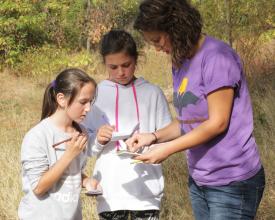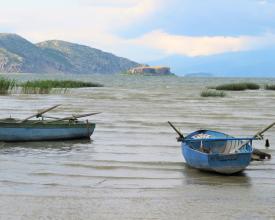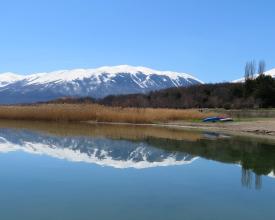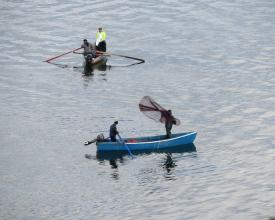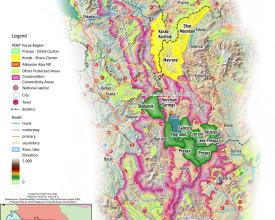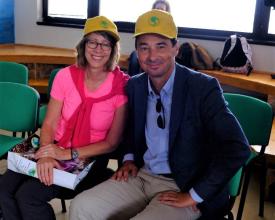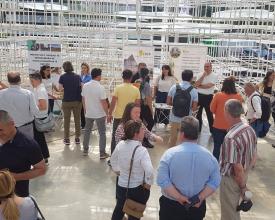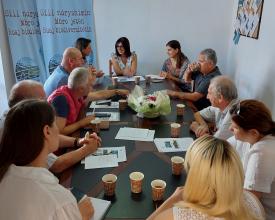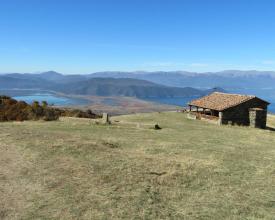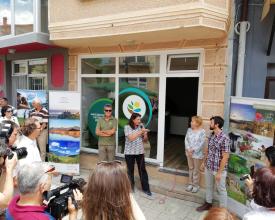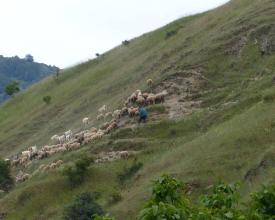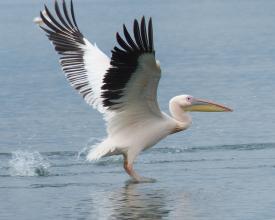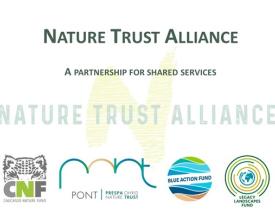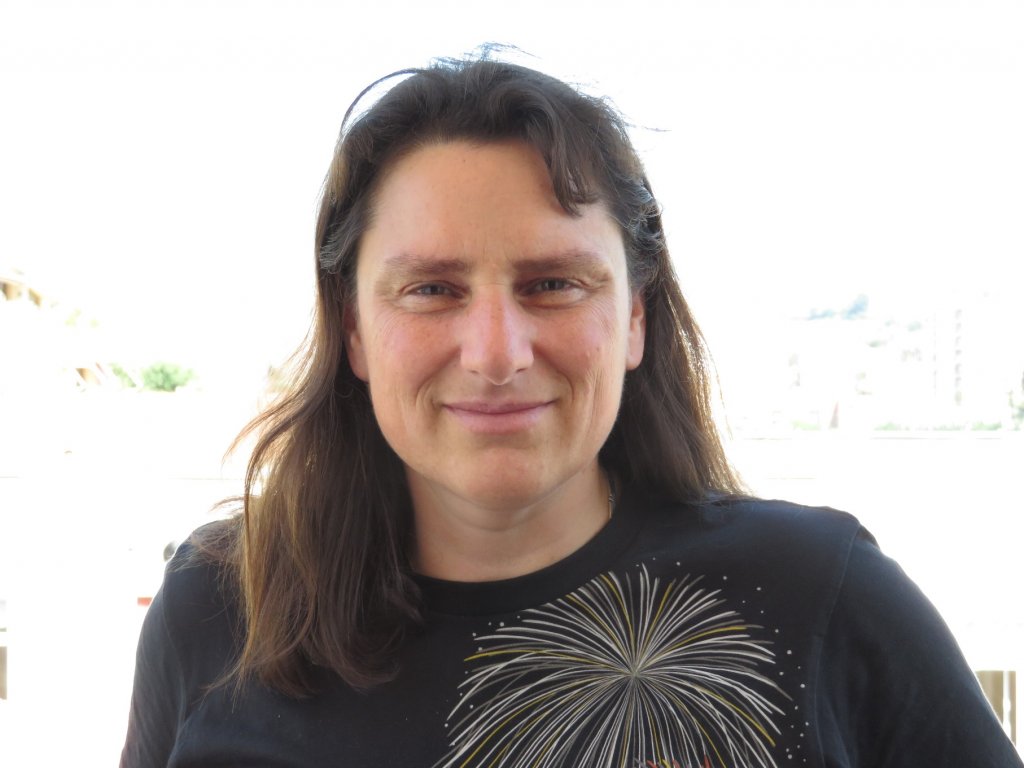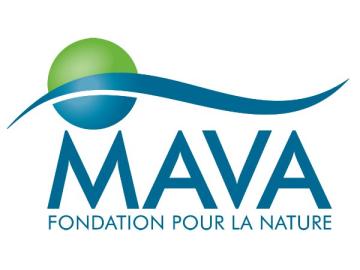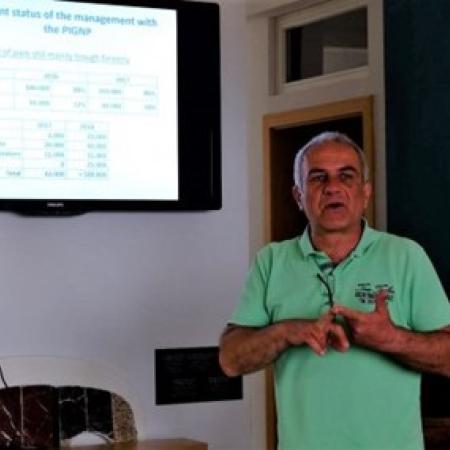
Prespa Ohrid Nature Trust (PONT) – an innovative partnership enhancing conservation and cooperation
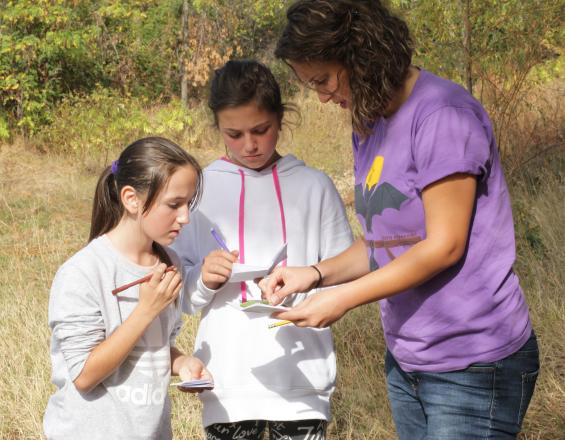
PONT is a transboundary conservation trust fund established in 2015 with funding from MAVA and BMZ/KfW. Their aim was to support the increasing environmental needs of the Prespa-Ohrid region to respond to the lack of sufficient funding for conservation efforts. In 2025, the PONT Focus Area is a Biodiversity Hotspot covering 1.9 million hectares in Albania, Greece and North Macedonia with further room for geographical expansion. The region has exceptional habitat diversity, supporting viable populations of endemic and rare species. Connectivity corridors help consolidate the landscape elements to ensure species movement between areas under protection (PAs). To ensure sustainable conservation and effective management of PAs, cooperation within and across borders is crucial. PONT has secured long-term financing (~€3 million/year drawdown until 2040), which is additionally used to leverage co-financing of activities. Grants support conservation objectives and capacity development. Shared services reduce administrative costs.
Context
Challenges addressed
Environmental: Conservation isn't a priority for the three national governments. The PA management bodies are weak in terms of conservation expertise and funding. Transboundary cooperation functions informally. The most important conservation challenges of the Prespa Lakes are related to water quality and eutrophication. Climate change is expected to cause a decline in suitable climate conditions, a slower natural migration of species, and the degradation of many natural habitats.
Socio-economic: High emigration rates and a consequent loss of social capital. The area is inhabited by an ethnically diverse mix of people with high unemployment rates, poor local economic conditions with difficulties in trading local products, and a lack of basic infrastructure. Civil society is weak in Albania and North Macedonia, though stronger in Greece. It is a rural area dominated by agriculture and some income from stockbreeding, fisheries, forestry and tourism.
Location
Process
Summary of the process
The transboundary conservation trust fund called PONT was established under a partnership between MAVA Foundation and KfW (on behalf of the German Government). It has financially facilitated conservation NGOs and protected area (PA) management bodies in the PONT Focus Area. Sustainable financing is focused on identified lessons learned and gaps in conservation management. PONT works in cooperation with leading local NGOs, PA management bodies and other stakeholders in the region. Through the long-term support and core financing of the PA bodies and the NGO network in the region, additional funding has been attracted for planned projects and activities including connectivity conservation. This has enabled daily operations and key programme activities to be sustained as well as allowing for important conservation-based projects for both the benefit of people and nature. The pooling of administrative services between four funds, through the shared service office Nature Trust Alliance, has led to a cost reduction which allows for more money to be allocated to the PONT grant programme and conservation objectives.
Building Blocks
Partnership between MAVA Foundation and KfW
A strong partnership between MAVA Foundation and KfW (on behalf of the German government) enabled the creation of PONT in 2015. Both partners have invested considerable funds in the Prespa region in the past in different projects and to sustain their efforts in perpetuity they joined forces to mobilise enough money to give PONT a great start. Successful fundraising allowed for several geographical expansions in 2021.The endowment and sinking funds enable PONT to co-finance the work of the protected areas and NGOs until at least 2040.
Enabling factors
Willingness by two strong donors for long-term financing of a biodiversity hotspot
Each donor has its geographical limitations but join forces to conserve the entire ecoregion
Dependency on each other through co-financing. The initial funding by MAVA Foundation enabled KfW to lobby for funding by the German government
Creation of synergies by experiences in supporting NGOs and the government sector
Support by other actors such as WWF Greece, Frankfurt Zoological Society, Caucasus Nature Fund, EuroNatur and CEPF
Lesson learned
Two strong donors invested in a specific geographical area, a biodiversity hotspot, in different projects. Both donors understood that to conserve this area it is important to secure long-term financing within and across state boundaries both for protected area management bodies as well as the civil society. It was understood that the financing gaps were mainly in the financing of running/operational costs. Both parties joined forces through the creation of a transboundary conservation trust fund to make this happen as they couldn't achieve the funding coverage of the entire landscape on their own. They did this with the help of strong partners with extensive knowledge in the PONT Focus Region i.e. WWF Greece and the Frankfurt Zoological Society. WWF Greece conducted the feasibility study on behalf of MAVA Foundation and KfW with the help of funding by the Critical Ecosystem Partnership Fund (CEPF). Caucasus Nature Fund and the Frankfurt Zoological Society gave important inputs as well.
PONT strategy promotes transboundary cooperation between government and non-government partners
The PONT strategy was elaborated by drawing on the experiences of the PONT partners who have worked in the area for a long time. By working directly with these NGOs and protected area management bodies the main conservation and capacity development objectives were determined. This resulted in a strategy focusing on the financing of the gaps and building of strong partnerships with stakeholders that have a mandate, vision and the expertise to achieve the conservation results in the PONT Focus Area. The PONT strategy promotes transboundary cooperation between government and non-government partners based on previous experiences.
Enabling factors
A comprehensive study gathering lessons learned of what was done in the last 25 years and where the remaining gaps are
Making use of the PA Management Bodies and NGOs to work on the PONT Strategy on a transboundary level for the entire PONT Focus Area
Available funding for both government and non-government partners
Lesson learned
Instead of re-inventing the wheel the previous experiences were gathered by PONT partners who have been working in the geographical area for a long time. This was done under coordination of WWF Greece who knows the area very well and could verify the results. The recommendations for the conservation objectives were verified by the protected area bodies and this formed the basis for the conservation objectives for the PONT strategy. With the help of PONT expertise other objectives such as organisational development and capacity development were identified and added. Over the years and several rounds of grant giving this resulted in an updated participatory developed strategy for the extended PONT Focus Area that was accepted by both government and non-government stakeholders within and across state borders. To focus financing on the identified gaps potential grantees are identified based on their mandate, vision, proven track record and expertise to work in the area. Eligible PAs being ‘PONT ready’ are directly invited to apply for grants while most NGOs enter the partnership via open Calls for Proposals.
Resources
Funding across the ecoregion enabling ecosystem management of habitats and wildlife on a landscape level
PONT is active in the following sectors:
• Conservation and enhancement of biodiversity – we provide long-term operational grants to Protected Areas to increase management effectiveness according to European / International standards. We give grants to Environmental Actors (mainly NGOs and some research institutes) to support important conservations actions in the Protected Areas and in the wider landscape to enhance connectivity conservation in both aquatic and terrestrial ecosystems. For the latter we determined the important Connectivity Conservation Areas.
• Sustainable management of natural resources – local people play a key role in the landscape and therefore we support activities linked to sustainable natural resource management (nature-based tourism; cultivation of medicinal aromatic plants and other non-timer forest products; support to various women groups; shepherds; local participation; citizens science, support to seasonal workers to assist in fire management; maintenance of hiking trails; etc.). Since 2022 PONT adopted and is implementing an Environmental and Social Management System.
Enabling factors
A donor willing to pay for staff salaries and overheads
Long-term secure financing
Long-term organisational development and presence on a local level
Lesson learned
PONT managed to increase its funding base by 300%. This has resulted in a growth from 1 grant in 2016 to 40 grants in 2023 (10 PAs and 30 EAs). PONT disburses about € 3-4 million per annum for two grant programmes supported by various donors (BMZ/KfW; MAVA Foundation; Hans Wilsdorf Foundation; Sigrid Rausing Trust; and the French Facility for Global Environment). “PONT’s Value-Added to the Focus Area. PONT has the agility to work directly on transboundary cooperation rather than through bilateral arrangements which is often the case for multilateral or bilateral donors. PONT is viewed as being a neutral actor in the region. Having no “agenda” and being recognized as a good listener and problem-solver, PONT has been able to contribute to advances in sensitive policy areas. PONT has the flexibility to provide operating support that is complementary to investments made with donor funding. It is one of few institutions that can provide grants for operating costs. PONT has stepped in to finance just in time studies that would have been delayed by donors’ complex procurement processes”. K. Mikitin, External Evaluator, 2023
Nature Trust Alliance: a partnership for shared services to save on administrative costs
PONT is part of a cooperation between four funds called the Nature Trust Alliance (NTA), to share operational services. NTA was established between the Caucasus Nature Fund (CNF) and PONT in June 2016. In March 2017, Blue Action Fund joined the working partnership followed by the Legacy Landscapes Fund in 2020. The mission of NTA is to “provide operational support to our partners to allow them to focus on their core missions in nature conservation”. The NTA office is in Frankfurt as all four partner funds of NTA are registered foundations in Germany. NTA enabled PONT to establish its Regional Programme Office in Tirana, Albania from which the grant programme is managed. Through this partnership for shared services, PONT is saving costs for administrative purposes (payments; accounting; reporting; audits; investment support; communication).
Enabling factors
Strengthened negotiating position with external service providers (banks, auditors, etc.)
Economies of scale by pooling certain services
Efficiencies in developing and implementing new procedures, systems and legislation compliance (1 time developing/4 times used)
Shared Investment Committee and investment policies
Lesson learned
It is important to analyse, define and agree on potential shared services. If there are no expected economies of scale it is not advisable to make it a shared service as the level of complexity increases in a shared services set-up. Identical type of services fit better in a shared services concept. In the case of NTA this means that administrative and investment related services in Germany are shared services. As the grant programmes and the site-specific administrative services are different for the four funds these are not included under the shared services.
Expectations, procedures and a management / governance structure should be discussed and agreed from the start. Clear and easy communication and decision making tools should be established. Regular knowledge sharing enables continuous improvement through learning from each other. An existing shared service office can be very beneficial for new funds in their start-up phase enabling a quick start. However, the entry of new partner fund should be carefully considered and there should be enough common elements to be beneficial.
Impacts
Through a partnership between MAVA and KfW (on behalf of the BMZ), and with the support of other donors, PONT provides sustainable financing for 40 partners (10 PAs and 30 Environmental Actors (EAs, mainly NGOs)) till 2040. In 2024, a territory of 351,234 ha of PAs is supported. PONT finances 36 strategic partnerships between PAs and EAs. A total of 90 green businesses are supported. The first interventions to enhance connectivity conservation started.
The core financing provided by the transboundary conservation trust fund enables the PONT partners to leverage additional funding for planned projects. The funding allows the NGO partners to run local offices and to work on their programmes in close cooperation with the PA management bodies over a long period of time. In 2024, the administrative cost ratio of PONT itself was 6%
PONT has contributed to advances in sensitive policy areas such as withdrawal of logging in PAs, especially Galicica NP, and promoted collaborative dialogue and actions to reduce regional tensions. In the new Albanian Alps NP and Shar Mountain NP, a critical contribution ensured a swift and impactful establishment of the administrative structure and initiation of operations and the effective implementation of the PA management plan.
Beneficiaries
The direct beneficiaries are the protected area management bodies, NGOs and research institutes operating in the three different countries. The indirect beneficiaries are the people living in the PONT Focus Area.
Global Biodiversity Framework (GBF)
Sustainable Development Goals
Story

Andon Bojadzi of Galicica National Park illustrates the importance of broad participation in protected area management planning. During the establishment of the management plan for Galicica National Park, a representative stakeholder council was established and consulted on the preparation of a management plan. All the villages located in and at the edge of Galicica National Park were involved in the zonation process and understood its contents. At a later stage the government of North Macedonia tried to alter the management plan of Galicica National Park to create a ski resort and access road. These developments threatened the World Heritage Status of the Lake Ohrid Region of which Galicica National Park is a part. The Galicica National Park authority by itself was not able to halt these plans, however together with the civil society and communities, they were stopped.
The previous management plan for Galiccia National Park was supported by KfW. Now the KfW helped to establish PONT and funding from PONT was used to update and establish the new management plan for Galicica National Park and the implementation thereof.
This includes funding for the consultation with communities. This is the first thing Andon Bojadzi did during the update of the management plan. Through the help of the local communities and local partnerships he feels much stronger to achieve his ambitions and goals. PONT helps him to work on these partnerships in the long-term.
Another ambition of Andon Bojadzi to make Galicica National Park independent from timber logging for the payment of staff salaries was realised in 2020. Although the government doesn't provide any funding for the management of Galicica National Park he managed to become independent on logging each year to pay the costs for the management. Gate entrance fees and tourism activities, together with the long-term sustainable support by PONT, is currently enough to manage the national park in partnership with the local community.

